| Listing 1 - 10 of 36 | << page >> |
Sort by
|
Book
ISBN: 2908024179 9782908024173 Year: 1991 Publisher: CIRCE,
Abstract | Keywords | Export | Availability | Bookmark
 Loading...
Loading...Choose an application
- Reference Manager
- EndNote
- RefWorks (Direct export to RefWorks)
Sociétés secrètes --- Secret --- Relations humaines --- Secret societies --- Secrecy --- GROUPES SOCIAUX --- SOCIETE SECRETE --- RELATIONS ENTRE GROUPES
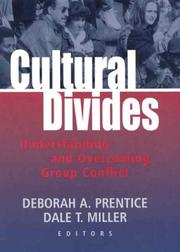
ISBN: 0871546906 Year: 1999 Publisher: New York : Russell Sage Foundation,
Abstract | Keywords | Export | Availability | Bookmark
 Loading...
Loading...Choose an application
- Reference Manager
- EndNote
- RefWorks (Direct export to RefWorks)
Cohabitation pluri-ethnique --- Ethnic relations --- Etnische relaties --- Groupes ethniques -- Relations --- Interethnic relations --- Relaties [Etnische ] --- Relations among ethnic groups --- Relations entre groupes ethniques --- Relations ethniques --- Relations interculturelles --- Relations interethniques --- Culture conflict --- United States --- Intergroup relations --- Multiculturalism --- Ethnopsychology --- Ethnic relations.
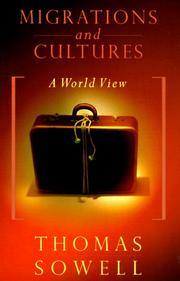
ISBN: 0465045898 046504588X Year: 1996 Publisher: New York, N.Y. Basic Books
Abstract | Keywords | Export | Availability | Bookmark
 Loading...
Loading...Choose an application
- Reference Manager
- EndNote
- RefWorks (Direct export to RefWorks)
Most commentators look at the issue of immigration from the viewpoint of immediate politics. In doing so, they focus on only a piece of the issue and lose touch with the larger picture. Now Thomas Sowell offers a sweeping historical and global look at a large number of migrations over a long period of time.'Migrations and Cultures:' shows the persistence of cultural traits, in particular racial and ethnic groups, and the role these groups' relocations play in redistributing skills, knowledge, and other forms of & human capital.& answers the question: What are the effects of disseminating the patterns of the particular set of skills, attitudes, and lifestyles each ethnic group has carried forth& both for the immigrants and for the host countries, in social as well as economic terms?
Migration. Refugees --- Economic order --- Cohabitation pluri-ethnique --- Culture --- Cultuur --- Ethnic groups --- Ethnic relations --- Etnische groepen --- Etnische relaties --- Groupes ethniques --- Groupes ethniques -- Relations --- Interethnic relations --- Race --- Ras --- Relaties [Etnische ] --- Relations among ethnic groups --- Relations entre groupes ethniques --- Relations ethniques --- Relations interculturelles --- Relations interethniques --- Culture. --- Emigration and immigration --- Ethnic groups. --- Ethnic relations. --- Race. --- Economic aspects. --- Economic aspects
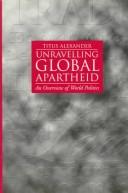
ISBN: 0745613535 Year: 1996 Publisher: Cambridge : Polity press,
Abstract | Keywords | Export | Availability | Bookmark
 Loading...
Loading...Choose an application
- Reference Manager
- EndNote
- RefWorks (Direct export to RefWorks)
Cohabitation pluri-ethnique --- Conscience nationale --- Consciousness [National ] --- Ethnic relations --- Etnische relaties --- Groupes ethniques -- Relations --- Identity [National ] --- Interethnic relations --- Nationaal bewustzijn --- Nationaal gevoel --- National consciousness --- National identity --- Nationalism --- Nationalisme --- Relaties [Etnische ] --- Relations among ethnic groups --- Relations entre groupes ethniques --- Relations ethniques --- Relations interculturelles --- Relations interethniques --- Sentiment national --- Economic lag. --- International economic relations. --- Regional economic disparities. --- Regionalism. --- Emigration and immigration --- Government policy --- Social aspects
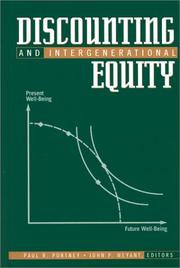
ISBN: 0915707896 9780915707898 Year: 1999 Publisher: Washington (D.C.) : Resources for the future,
Abstract | Keywords | Export | Availability | Bookmark
 Loading...
Loading...Choose an application
- Reference Manager
- EndNote
- RefWorks (Direct export to RefWorks)
Beleidswetenschappen --- Cost effectiveness --- Coûts-efficacité --- Generaties [Relaties tussen de ] --- Générations [Relations entre les ] --- Intergenerational relations --- Justice sociale --- Kostendoelmatigheid --- Policy sciences --- Politique [Sciences de la ] --- Rechtvaardigheid [Sociale ] --- Relaties tussen de generaties --- Relaties tussen generaties --- Relations [Intergenerational ] --- Relations entre groupes d'âge --- Relations entre générations --- Relations entre les générations --- Sciences de la politique --- Social justice --- Sociale rechtvaardigheid --- Cost effectiveness. --- Intergenerational relations. --- Policy sciences. --- Social justice.
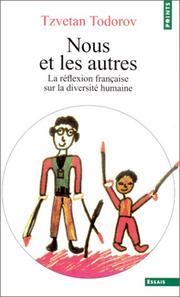
ISBN: 9782020182171 2020182173 Year: 1992 Volume: 250 Publisher: Paris : Seuil,
Abstract | Keywords | Export | Availability | Bookmark
 Loading...
Loading...Choose an application
- Reference Manager
- EndNote
- RefWorks (Direct export to RefWorks)
Ethnology --- Philosophy, French. --- Nationalism. --- Racism. --- Philosophy. --- History. --- Philosophy, French --- Nationalism --- Racism --- Philosophy --- History --- National characteristics, French --- Caractéristiques nationales françaises --- Ethnology - Philosophy --- Ethnology - France - History --- Études transculturelles --- Relations culturelles --- Relations interethniques --- Pluralisme (sciences sociales) --- Idéologie --- Philosophie --- Ethnocentrisme --- Nationalisme --- Populations d'origine continentale --- RELATIONS ENTRE GROUPES --- RACISME --- NATIONALISME --- Dans la littérature --- France --- Histoire
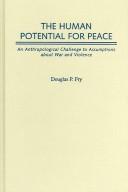
ISBN: 0195181778 0195181786 Year: 2006 Publisher: New York : Oxford University Press,
Abstract | Keywords | Export | Availability | Bookmark
 Loading...
Loading...Choose an application
- Reference Manager
- EndNote
- RefWorks (Direct export to RefWorks)
In The Human Potential for Peace: An Anthropological Challenge to Assumptions about War and Violence, renowned anthropologist Douglas P. Fry shows how anthropology--with its expansive time frame and comparative orientation--can provide unique insights into the nature of war and the potential for peace. Challenging the traditional view that humans are by nature primarily violent and warlike, Professor Fry argues that along with the capacity for aggression humans also possess a strong ability to prevent, limit, and resolve conflicts without violence. Raising philosophy of science issues, the author shows that cultural beliefs asserting the inevitability of violence and war can bias our interpretations, affect our views of ourselves, and may even blind us to the possibility of achieving security without war. Fry draws on data from cultural anthropology, archaeology, and sociology as well as from behavioral ecology and evolutionary biology to construct a biosocial argument that challenges a host of commonly held assumptions. The Human Potential for Peace includes ethnographic examples from around the globe, findings from Fry's research among the Zapotec of Mexico, and results of cross-cultural studies on warfare. In showing that conflict resolution exists across cultures and by documenting the existence of numerous peaceful societies, it demonstrates that dealing with conflict without violence is not merely a utopian dream. The book also explores several highly publicized and interesting controversies, including Freeman's critique of Margaret Mead's writings on Samoan warfare; Napoleon Chagnon's claims about the Yanomam"o; and ongoing evolutionary debates about whether "hunter-gatherers" are peaceful or warlike. The Human Potential for Peace is ideal for undergraduate courses in political and legal anthropology, the anthropology of peace and conflict, peace studies, political sociology, and the sociology of war and violence. Written in an informal style with nume
Violence --- War --- Peace --- Social control --- Intergroup relations --- Guerre --- Paix --- Contrôle social --- Relations intergroupes --- Conflict [Intergroup ] --- Conflict tussen groepen --- Conflit entre groupes --- Contrôle social --- Groepen--Conflicten --- Groupes--Conflits --- Groups--Conflicts --- Relaties tussen groepen --- Relations [Intergroup ] --- Relations entre groupes --- Intergroup relations. --- Peace. --- Social control. --- Violence. --- War.

ISBN: 0124829201 Year: 1983 Publisher: New York : Academic Press,
Abstract | Keywords | Export | Availability | Bookmark
 Loading...
Loading...Choose an application
- Reference Manager
- EndNote
- RefWorks (Direct export to RefWorks)
Caractères culturels --- Caractères ethniques --- Cohabitation pluri-ethnique --- Ethnic identity --- Ethnic relations --- Ethnicity --- Ethnicité --- Ethnisch bewustzijn --- Etnische relaties --- Groepsbewustzijn [Etnisch ] --- Group identity [Ethnic ] --- Groupes ethniques -- Identité --- Groupes ethniques -- Relations --- Identité culturelle --- Identité ethnique --- Identité raciale --- Identités ethniques --- Interethnic relations --- Pluralism (Social sciences) --- Pluralisme (Sciences sociales) --- Pluralisme (Sociale wetenschappen) --- Relaties [Etnische ] --- Relations among ethnic groups --- Relations entre groupes ethniques --- Relations ethniques --- Relations interculturelles --- Relations interethniques --- Tribalisme --- Cultural pluralism. --- Ethnic relations. --- Ethnicity. --- Pluralism (Social sciences).

ISBN: 2702123864 9782702123867 Year: 1996 Publisher: Paris Calmann-Lévy
Abstract | Keywords | Export | Availability | Bookmark
 Loading...
Loading...Choose an application
- Reference Manager
- EndNote
- RefWorks (Direct export to RefWorks)
Adolescence --- Adolescent boys --- Adolescent girls --- Adolescente jongens --- Adolescenten (Jongens) --- Adolescentie --- Adolescents (Garçons) --- Generaties [Relaties tussen de ] --- Générations [Relations entre les ] --- Intergenerational relations --- Jeunes filles (Adolescentes) --- Jonge meisjes (Adolescenten) --- Jongens in de adolescentie --- Relaties tussen de generaties --- Relaties tussen generaties --- Relations [Intergenerational ] --- Relations entre groupes d'âge --- Relations entre générations --- Relations entre les générations --- Teen-age --- Teenage boys --- Teenage girls --- Teenaged boys --- Teenaged girls --- Teenagers (Boys) --- Teenagers (Filles) --- Teenagers (Jongens) --- Teenagers (Meisjes) --- Teenagers--Development --- Tieners (Jongens) --- Tieners (Meisjes)
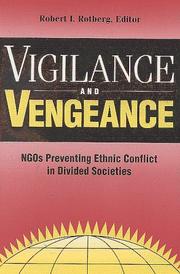
ISBN: 0815775873 Year: 1996 Publisher: Washington (D.C.) : Brookings institution,
Abstract | Keywords | Export | Availability | Bookmark
 Loading...
Loading...Choose an application
- Reference Manager
- EndNote
- RefWorks (Direct export to RefWorks)
Cohabitation pluri-ethnique --- Ethnic relations --- Etnische relaties --- Groupes ethniques -- Relations --- Interethnic relations --- NGO's --- NGOs (International agencies) --- Niet-gouvernementele organisaties --- Non-governmental organizations --- Nongovernmental organizations --- ONG --- Organisaties [Niet-gouvernementele ] --- Organisations non-gouvernementales --- Organizations [Non-governmntal ] (International agencies) --- PVOs (International agencies) --- Private and voluntary organizations (International agencies) --- Relaties [Etnische ] --- Relations among ethnic groups --- Relations entre groupes ethniques --- Relations ethniques --- Relations interculturelles --- Relations interethniques --- Culture conflict --- Ethnic conflict. --- Non-governmental organizations. --- Social conflict --- Prevention. --- Prevention --- Culture conflict - Prevention. --- Social conflict - Prevention.
| Listing 1 - 10 of 36 | << page >> |
Sort by
|

 Search
Search Feedback
Feedback About UniCat
About UniCat  Help
Help News
News